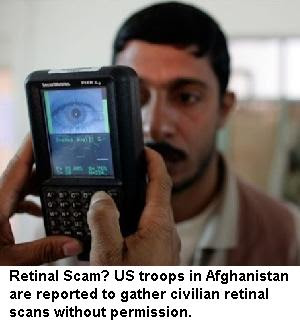US troops trample rights
Z Net's Japan Focus section is one of the best English language resources for analysis of East Asia, complete with essays and articles translated from Japanese and Korean. Today they featured a translation of several dispatches from Japanese photo journalist Shirakawa Toru, who writes of being embedded with an American unit which is probably a PRT in Khost province. What he reports about the troops' behaviour is quite jarring:
... I left the base with the humanitarian aid unit who said they were going to visit nearby houses. A protection unit accompanied us.In light of the above, particularly the deceitful and unwelcome entry of male troops into the home, it bears mentioning that the Geneva Conventions outlaw "Outrages upon personal dignity, in particular humiliating and degrading treatment." One would also think that civilians have a right not to be fingerprinted by occupation forces.
Though they call themselves doctors and vets, they look no different than combatants. They wear bulletproof vests and sunglasses. M16 rifles hang from their necks. Physicians who are supposed to be saving lives are carrying rifles. It is a strange spectacle.
As they approach a house, a man of about forty, presumably its owner, is standing in the doorway. The eyes with which he looks at the US troops are extremely frightened.
"Please don't come into the house. There's a woman inside. Please stop." The man firmly refuses the US army's medical assistance.
The commanding officer persuades the man to yield, promising that only female soldiers will enter.
The female soldiers enter the house. The protection unit soldiers follow directly after them. This is not what was promised.
As I enter the premises, I see protection unit soldiers on the roof.
I tense up. Nearly all the people who live in the border region support the Taliban. The Taliban often use private houses as a base. If any Taliban are discovered, there might be a firefight.
Fortunately, the protection unit emerges from the house having found no one who looks like a combatant.
Medical treatment has been given, but it is a formality. The man, whose skin is dry, has been given cream...
As we leave the house, we see that soldiers from the protection unit have lined up the males of the house against a wall.
A soldier is holding what looks like a camera against a man's face. The man's eye is reflected in the apparatus lens.
"I'm taking a photo of his retina and data-basing it."
I ask him what for, but the soldier says nothing more. According to what a British journalist familiar with army activities tells me later, it is so that when a Taliban fighter is captured they can check the data base and find out what village he is from. Evidently the data can also be useful for targeting air strikes...
No longer relying exclusively on military attacks, the US army is changing its strategy and attempting to win the people over through humanitarian aid.
Yet recalling that man's frightened eyes, I cannot think that the strategy is succeeding. Many Afghans regard the United States as an aggressor... (link)
As a footnote, here's the latest civilian casualty:
KABUL, May 27 - Coalition forces on Tuesday shot dead one Afghan and wounded another in the Afghan capital when they thought a vehicle was threatening their convoy, U.S. forces said in a statement... (link)




No comments:
Post a Comment